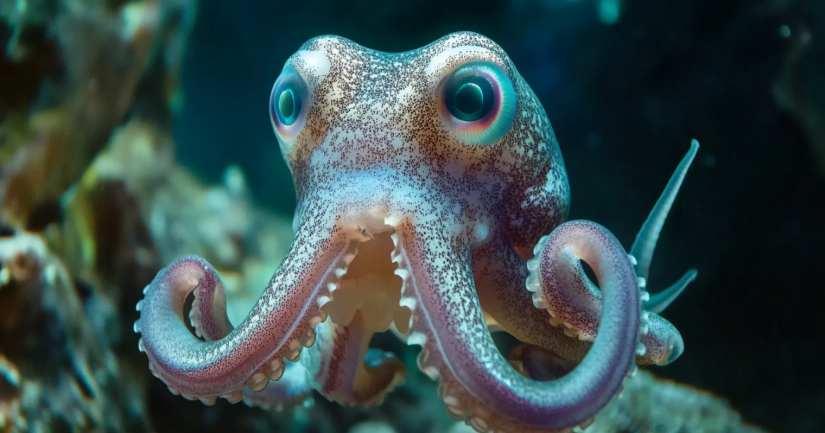
Squid Quiz Test Your Knowledge of These Mysterious Ocean Hunters! With tentacles that grab, ink that confuses predators, and the ability to change color in an instant, squid are some of the most mysterious and intelligent creatures of the deep sea. Found in oceans all over the world, from shallow coastal waters to the pitch-black depths of the abyss, these cephalopods have fascinated marine biologists, storytellers, and deep-sea explorers for centuries. But how much do you really know about squid? Take our Squid Quiz and put your marine knowledge to the test!
Squid belong to the cephalopod family, which includes octopuses, cuttlefish, and nautiluses. They are known for their jet-propulsion swimming, advanced problem-solving skills, and incredible ability to blend into their surroundings. Unlike most marine creatures, squid have three hearts, blue blood, and a beak-like mouth that can crush prey in seconds.
Squid Have the Largest Eyes in the Animal Kingdom The colossal squid, which lives in the deep ocean, has eyes that can reach up to 10 inches (25 cm) in diameter larger than a dinner plate!
Squid are intelligent and elusive, but the ocean’s wonders are endless! Take a look at the mysterious Silverfish Trivia for another deep dive, or uncover the secrets of star-shaped sea dwellers in our Starfish Quiz.
Mind-Blowing Squid Facts That Might Surprise You
- They Can Change Colors Instantly – Using special pigment cells called chromatophores, squid can camouflage, communicate, and even hypnotize prey by shifting colors in a split second.
- Some Squid Can Glow in the Dark – Certain species of deep-sea squid have bioluminescent organs, allowing them to create their own light in the pitch-black depths of the ocean.
- They Have a Built-in Escape Mechanism – When threatened, squid release a cloud of ink to distract predators, giving them time to escape
- Squid Move Using Jet Propulsion – By forcefully expelling water through their siphon, squid can move backward at high speeds, making them one of the fastest marine invertebrates.
- Their Beak is Stronger Than Any Other Part of Their Body – Despite their soft, boneless bodies, squid have a sharp, powerful beak made of chitin, capable of breaking through the shells of crabs and fish.
- Giant Squid Are Real – And They’re Enormous – Once thought to be the stuff of myths, giant squid (Architeuthis dux) can grow over 40 feet (12 meters) long, and their existence was only confirmed through live footage in recent years!
The Role of Squid in Marine Ecosystems
Squid are essential to ocean food chains, serving as both predators and prey. They hunt fish, shrimp, and even other squid, while being a key food source for whales, sharks, seabirds, and humans. Some squid species, like the Humboldt squid, are known for their aggressive hunting tactics and pack behavior, earning them the nickname “Red Devils” among fishermen.
However, climate change and overfishing are affecting squid populations, and scientists are studying how environmental changes may be shifting their migration patterns and increasing their numbers in some areas.
Are You Ready to Take the Ultimate Squid Quiz?
If you love marine biology, deep-sea mysteries, or incredible ocean creatures, this Squid Quiz is perfect for you! Whether you’re fascinated by giant squid, cephalopod intelligence, or the art of underwater camouflage, this quiz will challenge your knowledge and reveal amazing facts about these incredible invertebrates.
So, are you ready to dive into the world of squid and test your knowledge? Take the Squid Quiz now and see if you’re a true cephalopod expert! 🌊🦑
Love the ocean? Test your knowledge with the Guess the Sea Animal Quiz, discover your marine match in the What Sea Animal Am I Quiz, or explore more Marine Quizzes for underwater fun!
Squid – FAQ
A squid is a marine animal belonging to the class Cephalopoda, which also includes octopuses and cuttlefish. Squids are characterized by their elongated bodies, ten limbs (eight arms and two longer tentacles), and a unique internal structure known as the pen. Unlike octopuses, squids typically have a more streamlined shape, which aids in swimming, and they also possess specialized features like ink sacs for defense.
Squids can be found in various marine environments, ranging from shallow coastal waters to the deep ocean. Some species prefer the open ocean, while others inhabit the ocean floor. They are adaptable creatures and can thrive in both tropical and temperate waters, showcasing their versatility in different aquatic ecosystems.
Squids are carnivorous predators that primarily feed on fish, crustaceans, and smaller cephalopods. They employ a range of hunting techniques, including swift movements to ambush prey and the use of their tentacles to grasp or immobilize it. Their keen eyesight and ability to change color also aid in camouflage, making them effective hunters in their habitats.
The sustainability of squid as a seafood option varies depending on the species and fishing practices. Some squid populations are healthy and well-managed, while others may be overfished. It is advisable to look for seafood certified by organizations like the Marine Stewardship Council (MSC) to ensure that the squid you consume is sourced sustainably.
Squid is low in calories and high in protein, making it a nutritious choice for many diets. It is also a good source of essential nutrients, including vitamin B12, selenium, and omega-3 fatty acids. However, it is important to consume squid in moderation, as it can be high in cholesterol
